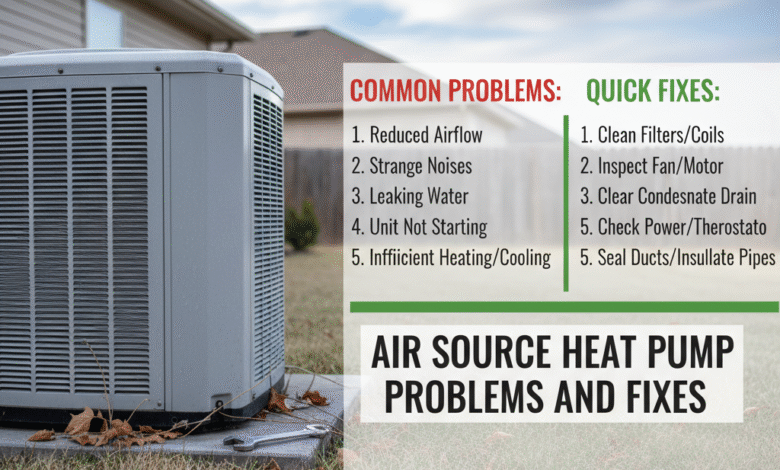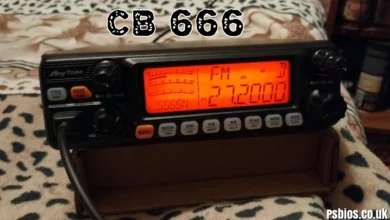Common Air Source Heat Pump Problems and Fixes

Air source heat pumps are becoming popular in the UK. They will keep homes safe and warm in the winter and can cool them in the summer. They extract warmth from outside air and transfer it inside.
Most people choose them because they will save money on energy bills and reduce carbon emissions. However, like every machine, they can go wrong. Some issues are minor, while others will require professional assistance.
Knowing what could go wrong, what to do about it, and when you can access support such as the air source heat pump grant is always beneficial.
Heat Pump Not Turning On
One of the issues that people usually encounter is that the pump won’t turn on. This might be because of power issues or because of tripped breakers. In some cases, the settings of the thermostat might also be wrong. Verify the controls so that it is in proper mode. If the fuse is blown, then it should be replaced. If breakers keep getting tripped, then get it inspected by an electrician. One should try to eradicate little issues before calling for maintenance.
Insufficient Heating
Another problem is when the pump runs but the house still feels cold. This could happen if the filters are dirty. Blocked filters restrict airflow and lower performance. Cleaning or replacing filters can restore proper heat. Sometimes refrigerant levels may be low. Leaks can reduce efficiency and harm the system. Low refrigerant must be fixed by a professional. Poor insulation in the home can also make heat pumps seem weak. Make sure doors and windows are sealed well.
Ice Build-up on Outdoor Unit
Ice can build up on the outdoor unit in cold weather. Heat pumps usually run a defrost cycle to clear this. If ice remains too long, then it may not work at all. Ensure that vent and fan parts are clean of dust. Avoid shattering ice with sharp objects as this could do more harm. If defrost mode fails often, call a qualified engineer. They can check sensors and controls. Good airflow and regular maintenance discourage ice building up.
Loud or Strange Noises
A noisy pump could be telling of trouble. Sounds of whistling, banging, or grinding are not normal. Loose parts or broken fans may cause such results. Bearings and motors can also wear over time. If you hear unusual sounds, switch off the system. Do not run it until checked. Not fixing sounds will cost more in the end. Small repairs done early cost less and keep the equipment safe.
Poor Airflow
Weak airflow is an issue with a lot of people. Dirty filters or clogged up ducts could be the cause. Regularly cleaning them keeps the airflow in line. If the fan motor is not efficient, then it could require repair. Poor airflow makes it unpleasant and strains the pump. It also costs more energy, therefore, driving up your bills. Always check the filters first as they are easy to clean. If issues persist, then call in a service technician.
Heat Pump Running Constantly
Sometimes pumps run without stopping. This is typically because of improper thermostat settings. Pumps work harder in colder months, but continuously, they should not work. If it does, it might be because of dirty filters or insufficient refrigerant. Low insulation is also a causative factor. Check around your house for leaks near doors and windows. Sealing leaks and using thick curtains work perfectly. If, after this, the pump remains continuously in operation, get it checked.
Thermostat Issues
Thermostats control how well heat pumps work. Defective thermostats can cause the system not to function properly. They may also read wrong temperatures and cause the pump to cycle on and off. Check batteries and settings first. Replace if simple fixes do not work. Smart thermostats will make homes more efficient, provided that thermostats are compatible. A professional will be able to recommend the best model for your home.
Leaking Water
Some homeowners see water leaking around the indoor unit. This often happens when the drain line is blocked. Condensation cannot flow away and begins to drip. Cleaning the drain line usually solves this. Leaks may also come from frozen coils. This indicates issues with airflow or refrigerant. If leaks are seen, act promptly to avoid water damage.
Electrical Problems
Electronic problems can render pumps inoperable. Bad connections or worn wires might lose power. The issues are dangerous and should not be disregarded. They should be corrected by a qualified electrician. The pumps should be subjected to annual safety inspections. Electric component maintenance decreases the likelihood of unpredicted breakdown.
Maintenance Tips
Most problems will be prevented by proper maintenance. Clean up the filters every month, especially in winter. Keep leaves and debris away from the outside unit. Book yearly checks with a qualified engineer. Preventive service can extend the life of your pump. It also keeps efficiency high, saving you money.
Eligibility for Help
In the UK, there are schemes to support homeowners with heat pumps. The Boiler Upgrade Scheme gives grants for installing air source heat pumps. To be eligible, you must own your home and replace fossil fuel heating. Properties must meet insulation standards to qualify. It cuts initial costs, so pumps cost less. In all instances, verify current regulations in advance. Tenants will hardly be able to secure the grant, while landlords can apply to rented properties. You might also need energy performance certificates.
When to Call a Professional
Certain repairs are simple, such as filtering cleaners or adjusting settings. But some requiretrained technicians. Always summon a professional in cases of refrigerant leaks, electric issues, or unusual noises. Routine maintenance identifies small issues before they become big ones. This keeps your pump safe and efficient.
Conclusion
Air source heat pumps work well, but they can have problems. Knowing the common issues helps you respond quickly. Some fixes are easy to do, but others require a professional. Taking care of them regularly prevents breakdowns and lowers costs.
In the UK, government help makes it easier to get these pumps. For homeowners still relying on older systems such as 1970s warm air heating, switching to a modern heat pump with grant support can be a smart upgrade.
Following the eligibility rules means you can receive grants. With proper care and service, heat pumps give comfort and save money for many years.




